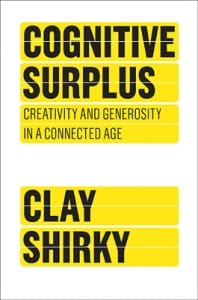Clay Shirky's Cognitive Surplus

A few weeks ago, a random email asked if I wanted to take part in helping promote Clay Shirky's new book Cognitive Surplus on a blog book tour. As a follower of Clay's writing for many years, I enthusiastically said yes, and they sent a hard copy of the book (I ended up buying a kindle version and read it on my iPhone, since I prefer that to printed books these days).
Simply put, Cognitive Surplus is a fantastic read that is loaded with real-world examples as well as tons of research that ties all the concepts together. The gist of the story Clay weaves is how we've spent the previous 50 years staring at televisions but the internet enables us to finally talk back, and even tiny slices of the time wasted watching TV when applied towards some collective output can result in massive repositories of information like Wikipedia. He shows many contemporary examples of online collaboration beyond Wikipedia.org and breaks down the motivations for contributors that cites plenty of sociology, psychology, and economics research to back his points up.
I've seen Clay speak at many conferences in the past and I've enjoyed, quoted, and argued many of his previous essays on his (sadly now languishing) site. I read his last book Here Comes Everybody as well, and the one thing that really blows me away about Cognitive Surplus is how he completely and utterly envelopes the points he wants to make. I feel like his previous work would touch on a whole bunch of issues but never really get to the heart of why things are the way they are, but in this new book he drills deep on every point with plenty of examples and studies to back him up. I've seen some criticism of various aspects of the book, where readers either think the trend of free collaboration online is short lived or that it's not part of a larger trend as Clay sees it. Clay is very much a futurist in some aspects, and his expertise has always been in spotting interesting new trends very early on, and describing them to large audiences right before they take root and become the norm.
I feel like we're on the cusp of a real revolution now thanks to the democratization of online tools. Back in the early days of the web and even blogging, you had to be a programmer, developer, or at least technically minded enough to write your own software, publish your own HTML, and manage your sites using many disparate tools. It was very much like the days of very early television where the guys that could control the cameras wrote all the shows because there wasn't any other way. In 2010, we thankfully have a ton of simple to use tools like Twitter, Tumblr, and Posterous that take the need to be a programmer or developer out of the equation and simply let anyone say what they want with minimal knowledge and minimal friction. In the future, we'll see these tools used in ways we never thought possible and when the next unknown random person makes a post that becomes worldwide news, I'm sure Clay Shirky will be there to tell us all about it, and I very much look forward to reading about it.
Subscribe to our newsletter.
Be the first to know - subscribe today





